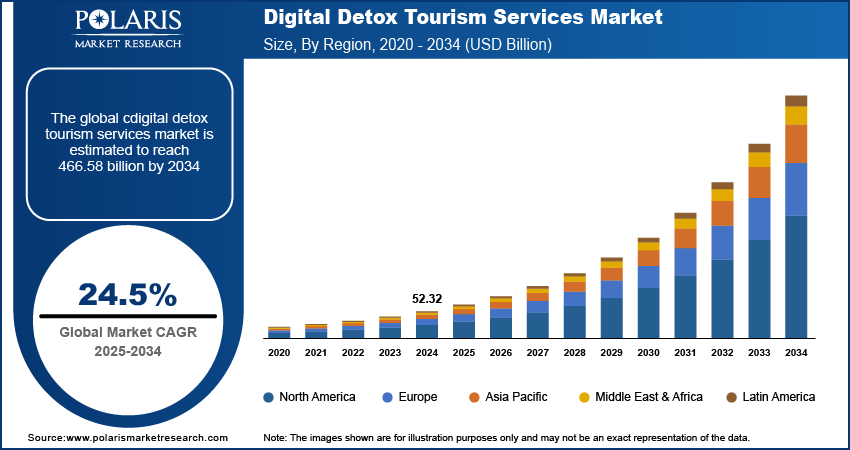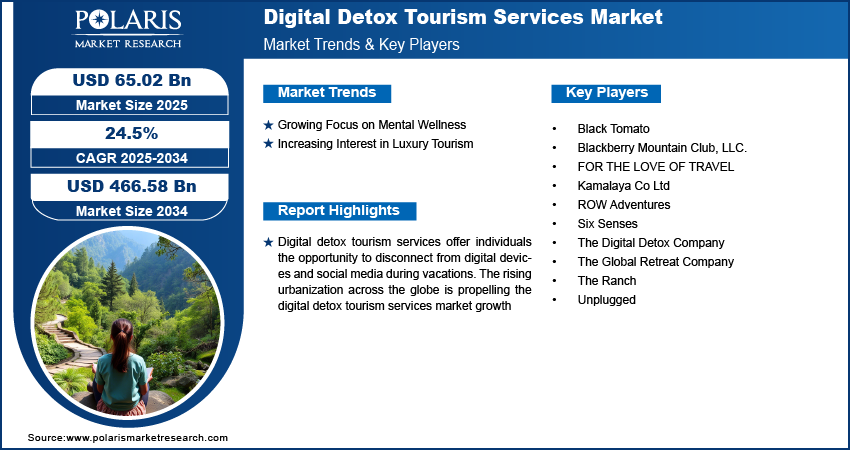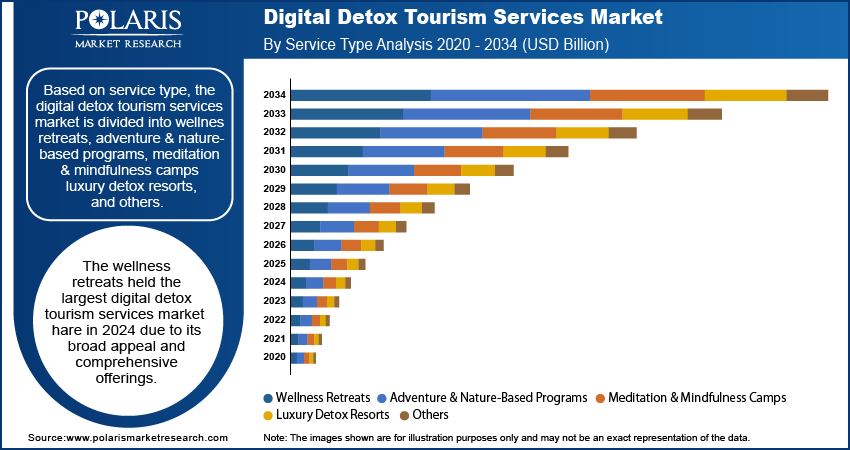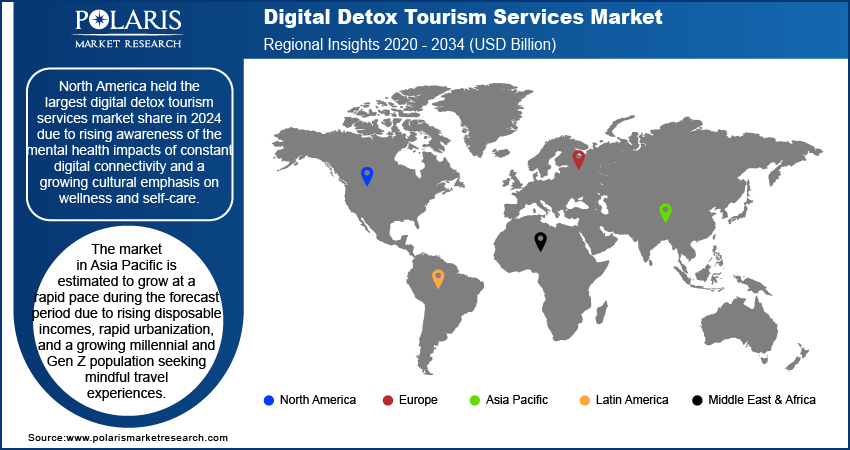
Digital Detox Tourism Services Market Size, Share, Trends, Industry Analysis Report
: By Service Type (Wellness Retreats, Adventure & Nature-Based Programs, Meditation & Mindfulness Camps, Luxury Detox Resorts, and Others), Duration, End User, and Region (North America, Europe, Asia Pacific, Latin America, and Middle East & Africa) – Market Forecast, 2025-2034
- Published Date:May-2025
- Pages: 129
- Format: PDF
- Report ID: PM5595
- Base Year: 2024
- Historical Data: 2020-2023
Digital Detox Tourism Services Market Overview
Digital detox tourism services market size was valued at USD 52.32 billion in 2024. The market is projected to grow from USD 65.02 billion in 2025 to USD 466.58 billion by 2034, exhibiting a CAGR of 24.5% during 2025-2034.
Digital detox tourism services offer individuals the opportunity to disconnect from digital devices and social media during vacations. This form of tourism caters to the increasing demand for experiences that prioritize mental well-being, mindfulness, and genuine human connections over constant connectivity. Digital detox tourism services involve intentional disconnection from electronic devices such as 5G smartphones, laptops, tablets, and even the internet, allowing travelers to immerse themselves in their surroundings without distractions. Destinations offering digital detox services often include nature-based retreats, eco-tourism lodges, or remote areas with minimal or no network signals.
The rising urbanization across the globe is propelling the digital detox tourism services market growth. The World Bank published a report stating that the urban population is expected to more than double by 2050. Urban areas are becoming more crowded and technology-driven, which leads to higher stress levels among residents. People in cities constantly use smartphones, computers, and other digital devices for work and personal tasks. This constant connectivity creates a need for individuals to disconnect from their digital lives and find peace in natural settings, thereby driving demand for digital detox tourism services. Urbanization also brings about lifestyle changes that make people crave disconnection. City life often involves long working hours, traffic congestion, and limited access to green spaces. These factors contribute to mental fatigue and burnout, encouraging people toward digital detox tourism services, as these services reduce mental fatigue and burnout by immersing people in serene environments. Therefore, as urban populations grow and digital fatigue becomes more common, people actively seek out digital detox tourism services.

To Understand More About this Research: Request a Free Sample Report
The digital detox tourism services market demand is driven by the growing employment in developing countries. As per the Reserve Bank of India’s (RBI) latest KLEMS data, employment in India increased to 64.33 crore in the year 2023-24 compared to 47.15 crore in 2014-15. Increased employment leads to higher workloads and longer hours, especially in jobs that require constant connectivity. Many professionals rely on wearable technology, smartphones, laptops, and IoT technology and devices to stay productive and meet deadlines. This reliance on technology leads to stress and burnout, encouraging employees to invest in digital detox tourism services to escape their tech-heavy routines and find relief in environments where they can disconnect. Employment growth also leads to high disposable income to spend on leisure activities, driving demand for digital detox tourism services. Hence, the demand for digital detox tourism services is increasing with the growing employment in developing countries such as India.
Digital Detox Tourism Services Market Dynamics
Growing Focus on Mental Wellness
People are becoming more aware of how their mental health impacts their overall quality of life. This awareness drives them to seek and invest in solutions such as digital detox tourism services, as these services address stress, anxiety, and burnout. Additionally, the growing incidence of chronic conditions such as diabetes and hypertension is propelling people to focus on mental and physical wellness. This increased focus fueled demand for digital detox retreats as these retreats provide environments where participants engage in activities such as meditation, yoga, and nature exploration. These activities enhance their mental wellness while reducing their stress and burnout. Thus, the demand for digital detox tourism services is rising with the growing focus on mental wellness.
Increasing Interest in Luxury Tourism
Luxury travelers seek unique and exclusive experiences that set their vacations apart from typical getaways. These individuals prefer to invest in high-end offerings that promise relaxation, privacy, and personal growth. Digital detox retreats cater to this desire by providing premium environments where guests disconnect from technology and immerse themselves in serene environments. Luxury travel further emphasizes customization and exclusivity, which aligns perfectly with the concept of digital detox retreats. Digital detox retreats offer personalized programs, such as private meditation sessions, gourmet meals, and access to pristine natural landscapes.

Digital Detox Tourism Services Market Segment
Digital Detox Tourism Services Market Evaluation by Service Type
Based on service type, the digital detox tourism services market is divided into wellness retreats, adventure & nature-based programs, meditation & mindfulness camps, luxury detox resorts, and others. The wellness retreats segment held the largest digital detox tourism services market share in 2024 due to its broad appeal and comprehensive offerings. Travelers increasingly chose wellness retreats as these programs provided structured environments focused on physical, mental, and emotional well-being. Urban stress, long screen times, and the rising awareness of burnout prompted many individuals to prioritize holistic health. Wellness retreats attracted a wide demographic by combining digital disconnection with services such as spa treatments, nutritional counseling, yoga sessions, and therapeutic workshops. The accessibility of wellness-focused destinations in both domestic and international travel also contributed to the segment’s dominance.
Digital Detox Tourism Services Market Assessment by End User
The digital detox tourism services market segmentation, based on end user, includes corporate professionals, families & couples, solo travelers, students & young adults, and others. The students & young adults segment is expected to grow at a robust pace in the coming years, owing to the heavy screen usage in both academic institutes. Additionally, students and young adults tend to seek adventure, exploration, and self-discovery experiences that digital detox tourism offers in abundance. The rise of social media detox trends and the growing popularity of minimalism among younger generations further support segment growth.

Digital Detox Tourism Services Market Regional Analysis
By region, the study provides the digital detox tourism services market insights into North America, Europe, Asia Pacific, Latin America, and the Middle East & Africa. North America held the largest market share in 2024 due to rising awareness of the mental health impacts of constant digital connectivity and a growing cultural emphasis on wellness and self-care. The US led the region, driven by high levels of stress-related illnesses such as depression, anxiety, and others. The 2021 National Survey on Drug Use and Health stated that 21 million adults in the US had at least one major depressive episode in the past years. A strong wellness tourism infrastructure, particularly in states such as California and Colorado, further accelerated demand for digital detox tourism services. Additionally, aggressive marketing by wellness brands and an increasing number of influencers promoting offline travel experiences contributed to the region’s digital detox tourism services market dominance.
The digital detox tourism services market in Asia Pacific is estimated to grow at a rapid pace during the forecast period due to rising disposable incomes, rapid urbanization, and a growing millennial and Gen Z population seeking mindful travel experiences. India is emerging as a major country in the region due to its deep-rooted spiritual and wellness traditions, such as yoga and Ayurveda, which naturally align with digital detox experiences. Destinations such as Rishikesh, Kerala, and Dharamshala have seen a surge in international and domestic tourists looking for immersive, digital detox tourism. Moreover, government-backed campaigns promoting wellness tourism and investments in eco-friendly, off-grid accommodations are strengthening the country’s position in the market, thereby fueling the market expansion in the region.

Digital Detox Tourism Services Key Market Players & Competitive Analysis Report
The digital detox tourism services market opportunity is constantly evolving, with numerous companies striving to innovate and distinguish themselves. Major global companies dominate the market by leveraging extensive research and development and advanced techniques. These companies pursue strategic initiatives such as mergers, acquisitions, partnerships, and collaborations to enhance their product portfolio offerings and expand into new markets.
The digital detox tourism services market is fragmented, with the presence of numerous global and regional market players. Major players in the market are Black Tomato; Blackberry Mountain Club, LLC.; FOR THE LOVE OF TRAVEL; Kamalaya Co Ltd; ROW Adventures; Six Senses; The Digital Detox Company; The Global Retreat Company; The Ranch; and Unplugged.
The Digital Detox Company, founded by Levi Felix in Oakland, California. The company’s programs mandate participants to unplug from technology for several days, fostering mindfulness and presence in their lives. The Digital Detox provides tools and resources aimed at cultivating sustainable habits that encourage intentional living. The Digital Detox Company has been instrumental in popularizing the concept of intentional disconnection as a means of achieving balance in a technology-saturated world. Its impact resonates not only with individuals seeking personal growth but also with entrepreneurs aiming to enhance their focus and creativity.
Unplugged is a UK-based company that specializes in providing digital detox retreats, offering a much-needed escape from the overstimulated, always-online lifestyle of modern city people. Founded in 2020 by Hector Hughes and Ben Elliott, the company’s retreats are designed to help individuals disconnect from their devices and reconnect with nature, themselves, and their surroundings. The retreats take place in isolated, minimalist cabins located within a two-hour drive from major cities such as London, Bristol, and Manchester. Guests sign up for three-day stays during which their phones and other digital devices are locked away in a secure box upon arrival. Since its inception, Unplugged has expanded to include 19 cabins and has gained popularity among busy professionals seeking respite from their hectic routines.
Key Companies in Digital Detox Tourism Services Market
- Black Tomato
- Blackberry Mountain Club, LLC.
- FOR THE LOVE OF TRAVEL
- Kamalaya Co Ltd
- ROW Adventures
- Six Senses
- The Digital Detox Company
- The Global Retreat Company
- The Ranch
- Unplugged
Digital Detox Tourism Services Market Developments
March 2025: The Government of Karnataka (India) launched the Digital Detox Initiative (DDI) program to reduce digital addiction through structured interventions and encourage balanced technology use.
October 2020: Taj Hotels announced the launch of the Digital Detox program designed by Jiva experts to offer curated detox therapies, mindfulness sessions, and wellness cuisine at Taj Hotels across serene destinations.
Digital Detox Tourism Services Market Segmentation
By Service Type Outlook (Revenue, USD Billion, 2020-2034)
- Wellness Retreats
- Adventure & Nature-Based Programs
- Meditation & Mindfulness Camps
- Luxury Detox Resorts
- Others
By Duration Outlook (Revenue, USD Billion, 2020-2034)
- Short-Term
- Medium-Term
- Long-Term
By End User Outlook (Revenue, USD Billion, 2020-2034)
- Corporate Professionals
- Families & Couples
- Solo Travelers
- Students & Young Adults
- Others
By Regional Outlook (Revenue, USD Billion, 2020-2034)
- North America
- US
- Canada
- Europe
- Germany
- France
- UK
- Italy
- Spain
- Netherlands
- Russia
- Rest of Europe
- Asia Pacific
- China
- Japan
- India
- Malaysia
- South Korea
- Indonesia
- Australia
- Vietnam
- Rest of Asia Pacific
- Middle East & Africa
- Saudi Arabia
- UAE
- Israel
- South Africa
- Rest of Middle East & Africa
- Latin America
- Mexico
- Brazil
- Argentina
- Rest of Latin America
Digital Detox Tourism Services Market Report Scope
|
Report Attributes |
Details |
|
Market Size Value in 2024 |
USD 52.32 Billion |
|
Market Size Value in 2025 |
USD 65.02 Billion |
|
Revenue Forecast by 2034 |
USD 466.58 Billion |
|
CAGR |
24.5% from 2025 to 2034 |
|
Base Year |
2024 |
|
Historical Data |
2020– 2023 |
|
Forecast Period |
2025 – 2034 |
|
Quantitative Units |
Revenue in USD Billion and CAGR from 2025 to 2034 |
|
Report Coverage |
Revenue Forecast, Market Competitive Landscape, Growth Factors, and Industry Trends |
|
Segments Covered |
|
|
Regional Scope |
|
|
Competitive Landscape |
|
|
Report Format |
|
|
Customization |
Report customization as per your requirements with respect to countries, regions, and segmentation. |
FAQ's
The global digital detox tourism services market size was valued at USD 52.32 billion in 2024 and is projected to grow to USD 466.58 billion by 2034.
The global market is projected to register a CAGR of 24.5% during the forecast period.
North America had the largest share of the global market in 2024.
Some of the key players in the market are Black Tomato; Blackberry Mountain Club, LLC.; FOR THE LOVE OF TRAVEL; Kamalaya Co Ltd; ROW Adventures; Six Senses; The Digital Detox Company; The Global Retreat Company; The Ranch; and Unplugged.
The wellness retreats segment dominated the digital detox tourism services market in 2024.
The students & young adults segment is expected to grow at the fastest pace in the coming years.
